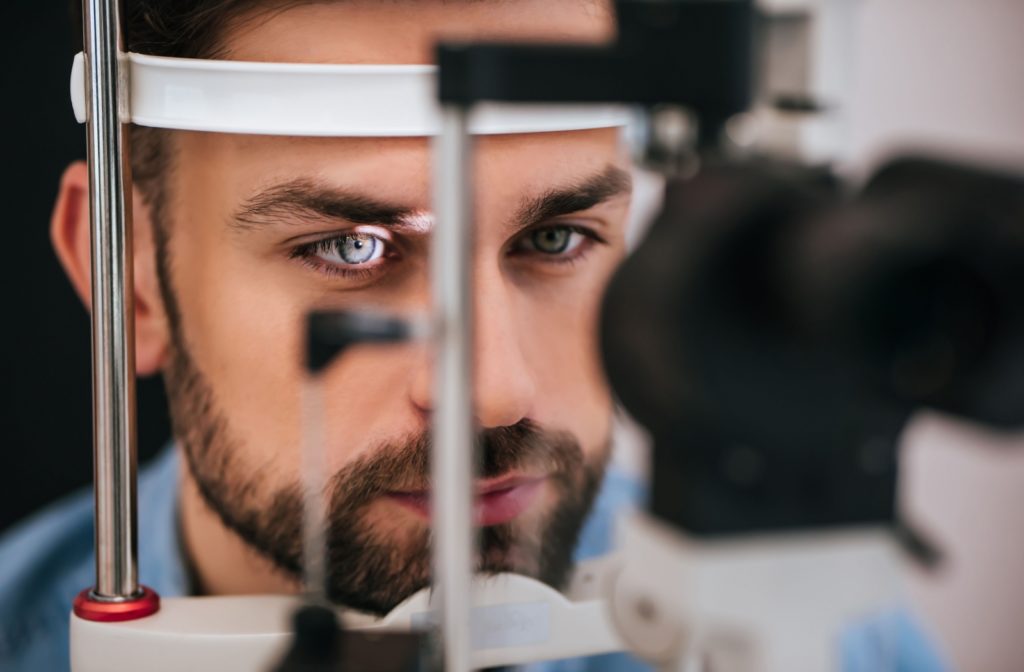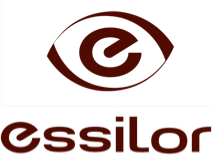Living in Edmonton, where the climate can be harsh, dry eye syndrome is a common condition that many residents face.
A dry eye exam is important in diagnosing and managing this condition effectively. But what exactly is a dry eye exam?
A dry eye exam is a specific procedure performed by your optometrist at Eye Care Group to determine if you are experiencing dry eyes. They do not just ask about the dryness of your eyes but also look for other indicators, such as reduced tear production or an imbalance in your tear system. Specific tests, such as measuring tear production or assessing the quality of your tears, may be conducted during this exam.
Looking for immediate relief? [See our recommended dry eye treatments]
What Is Dry Eye Syndrome?
Dry eye syndrome, also known as dry eye disease, is a common condition where your eyes do not produce enough tears, or the tears they produce are not of the right quality. This lack of adequate lubrication can lead to several uncomfortable symptoms, including a stinging or burning sensation, redness, and even blurred vision.
As we age, this condition can become more prevalent. However, certain activities like prolonged screen time or exposure to dry environments can also trigger it.
Symptoms of Dry Eye
Symptoms of dry eye syndrome can include a dry, gritty or burning sensation in the eyes, redness, watery or teary eyes, contact lens discomfort, and mucus that makes the eyes feel “glued shut” after sleep.
If you are experiencing any of these symptoms, it is important to have your eyes examined by a professional. They can help determine if you are dealing with dry eye syndrome and suggest appropriate treatments to alleviate your discomfort.
Risk Factors of Dry Eye
You might be more likely to get dry eye if you are pregnant, on hormone replacement therapy, or going through menopause. Several factors can increase your risk:
- You might be more prone to dry eyes if you have chronic allergies.
- Being exposed to wind or dry air often, like having a heater running all winter, can dry out your eyes.
- You might be at a higher risk if you have had LASIK eye surgery.
- Some medications, like antihistamines, nasal decongestants, birth control pills, and antidepressants, can cause dry eyes.
- Long-term contact lens wear can irritate your eyes and cause dryness.
- Not blinking enough can make your eyes dry out.
- If you have thyroid disease or other conditions that push your eyes forward, you are at a higher risk.
- Lupus, rheumatoid arthritis, and other immune system disorders can cause dry eyes.
- Nocturnal lagophthalmos, which happens when you sleep with your eyes partially open, can also cause dry eyes.
- Vitamin A deficiency, which is unlikely if you eat a balanced diet, can cause dry eyes.
Importance of Dry Eye Exams
A dry eye exam is essential for several reasons:
- Early detection: Detecting dry eye syndrome early can prevent complications and improve treatment outcomes.
- Proper diagnosis: A comprehensive dry eye exam helps accurately diagnose the underlying cause of the condition, whether it is related to tear production, tear quality, or environmental factors.
- Customized treatment: Based on the exam findings, personalized treatment plans can be developed to manage dry eye symptoms effectively.
Components of a Dry Eye Exam
A dry eye exam typically includes the following components:
- Patient history: Your eye care provider will likely ask about your symptoms, medical history, medications, and environmental factors that may contribute to dry eye syndrome.
- Ocular surface evaluation: This involves assessing the quality and quantity of your tears and examining the surface of your eyes for any abnormalities.
- Tear function tests: These tests measure the volume and quality of your tears to determine if they are sufficient for maintaining eye health.
- Additional testing: Depending on your symptoms and the initial evaluation findings, additional tests such as corneal staining or meibomian gland assessment may be performed.
Dry Eye Management & Treatment
There are a multitude of treatments that can provide immediate relief, while supporting the long term health of your eyes as well. Some of the treatments we recommend:
- Bruder Masks: Provides relief for dry eyes by maintaining moisture levels around the eye area.
- UMAY: Not only alleviates symptoms of dry eyes but also aids in relaxing an overworked brain, offering dual benefits for eye health and mental relaxation.
- Neurolens: Addresses dry eye symptoms by correcting vision misalignment, which can contribute to eye dryness, enhancing both eye comfort and visual clarity.
- MGD Drops: Stimulates the Meibomian glands for improved efficiency, reducing dry eye symptoms when used regularly and consistently.
- I-Defense for Sleep-Related Dry Eye: Offers relief and alleviates symptoms of dry eyes, especially for those experiencing the condition due to their eyes staying open while sleeping.
- Omega-3 supplements (i-vu by I-Med): Plays a significant role in treating dry eye by purifying fish oil through a re-esterified process, improving taste and enhancing the body’s ability to absorb & utilize it for effective relief from dry eye symptoms.
Some management and treatment strategies include:
- Heat compresses: The Bruder moist heat eye compress opens up your oil glands and facilitates the flow of natural oils back into your eyes. Plus, it is not just for dry eye–it can also help alleviate digital eye strain.
- Eyelid cleansing products: Cleansing products specifically designed for eyelid and lash hygiene are excellent at eliminating mucus, ocular debris, and makeup, all while moisturizing the surrounding skin. They can also effectively manage inflammation and redness around your eyelids.
- Artificial tears: Artificial tears, often readily available without a prescription, are designed to mimic the natural moisture in your eyes. They serve as an effective solution for managing inflammation in the cornea, helping your eyes remain comfortable and well-lubricated. These eye drops can be used as required, providing flexibility for your eye care needs.
Taking Charge of Your Eye Health with a Dry Eye Exam
If you are experiencing symptoms of dry eye syndrome, such as dryness, irritation, or blurred vision, scheduling a dry eye exam with your eye doctor at Eye Care Group is important for proper diagnosis and management.
By understanding what a dry eye exam entails, you can proactively protect your eye health and improve your overall quality of life. Do not hesitate to reach out to us to schedule an appointment today.




